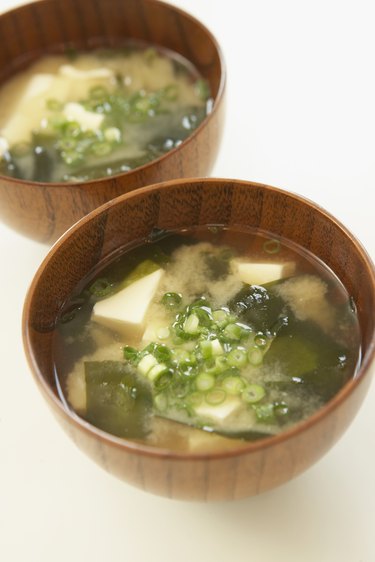
After practicing as a gastroenterologist for decades, Dr. Hiromi Shinya claims he has discovered the key to better health: a diet heavy in plant-based foods with few or no dairy products or animal-based protein. His theory, which he detailed in his 2007 book "The Enzyme Factor," is based on the premise that this type of diet will maintain your enzyme concentration, leading to a healthier digestive tract and a lower overall risk of disease. While many of Shinya's principles conform to those recommended by the U.S. Department of Agriculture, others are not supported by scientific evidence. Go over the plan with your doctor before beginning.
Basic Guidelines
Video of the Day
Shinya advises obtaining 85 to 90 percent of your food from plants, with approximately 50 percent of this from whole grains, beans and legumes, 30 percent from colorful vegetables and the remainder from fruit, nuts, seeds and plant milks. Fifteen percent or less of your daily meals should contain fish, poultry or eggs, with red meat eaten seldom, though preferably not at all. Chocolate, all types of black or green tea, alcohol, coffee, sweeteners, table salt and fats -- including heart-healthy ones like olive oil -- are discouraged. According to Shinya, the foods forbidden on his diet require more energy -- and more enzymes -- to digest compared to whole plant foods. If you eat too many, you won't have sufficient enzymes for digestion and will develop health problems.
Video of the Day
Sample Daily Menu
A typical day on Shinya's diet begins with 2 to 3 cups of water first thing in the morning. Shinya recommends drinking Kangen water, a commercial brand of alkaline water that is said to prevent disease by counteracting acidity in your body. Breakfast is a piece of whole fruit, such as an apple or an orange, followed by more water and a light lunch. Shinya suggests vegetable broth or miso soup. Lightly steamed vegetables such as spinach, snow peas, carrots, broccoli and bean sprouts paired with brown rice and no more than 3 or 4 ounces of steamed fish could be dinner. Choose low-mercury fish such as salmon, pollock, sole or mackerel.
Possible Benefits
It's likely that you will lose weight following Shinya's diet. Reducing your intake of processed and fast foods, fat, refined grains and added sweeteners while significantly increasing your consumption of whole grains, fruits and vegetables may make it easier for you to manage conditions like diabetes, hypertension, high blood cholesterol and heart disease. An "Archives of Internal Medicine" study published in 2012 reported that limiting your red meat as Shinya advises may decrease your risk of dying from any chronic medical problem, including cancer. The diet emphasizes regular moderate exercise, sleeping six to eight hours nightly, meditation and taking time each day for personal enjoyment.
Potential Disadvantages
Unless your daily meals are carefully planned or you regularly take dietary supplements, Shinya's plan may leave you vulnerable to deficiencies in calcium, vitamin B-12, vitamin D, iron or omega-3 fatty acids. The plan may be too restrictive for some people to maintain, particularly if other family members aren't adhering to the same guidelines. Although the diet is likely to yield benefits, Shinya acknowledges that there is no scientific evidence proving his theory that certain foods deplete enzyme concentrations and harm your health. Physician and University of Arizona professor Dr. Andrew Weil questions Shinya's endorsement of Kangen water, saying that the purported benefits of alkaline water products are unfounded.
- Happy Healthy Long Life: Dr. Hiromi Shinya, The Physician-Inventor of the Colonoscopic Polypectomy: What He's Learned About Diet and Health from Over 300,000 Colonoscopies
- Enzymefactor.com: Learning How Not to Eat Is as Important as Learning What to Eat
- DrWeil.com: Is Kangen Water Healthful?
- Archives of Internal Medicine: Red Meat Consumption and Mortality -- Results From 2 Prospective Cohort Studies